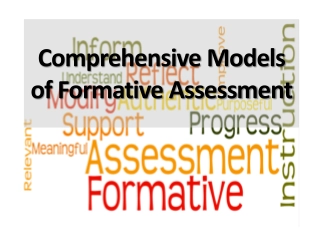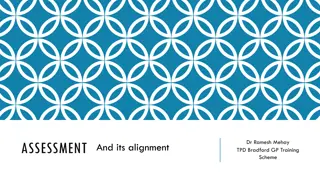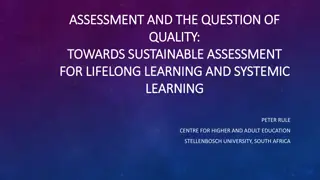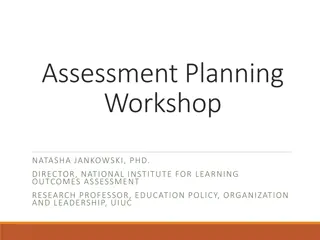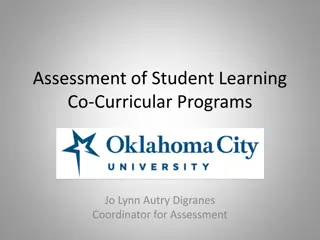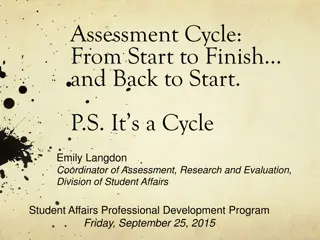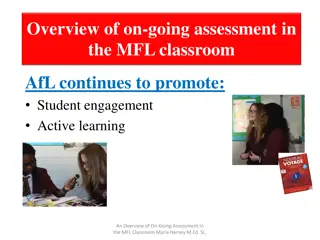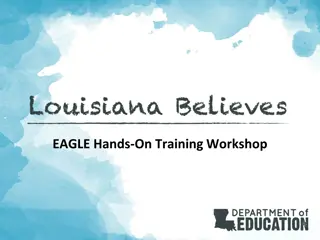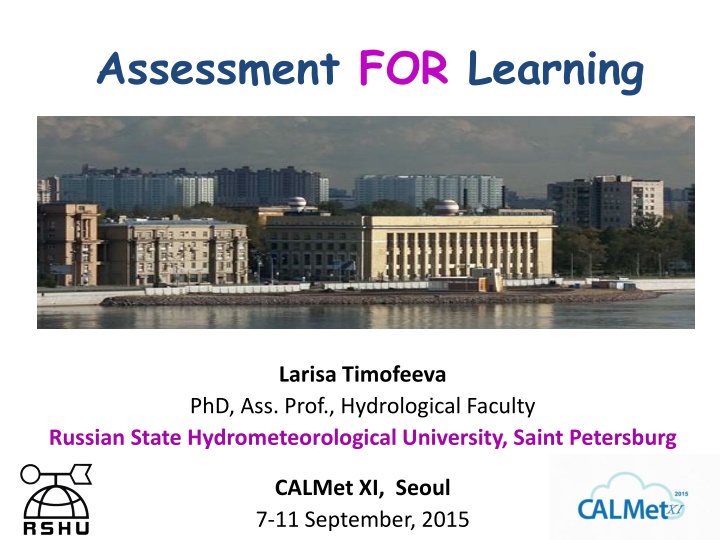
Assessment for Learning in Educational Settings
Explore the significance of assessment for learning in education, including formative assessment, feedback provision, and the impact on students' educational outcomes. Learn from experts like Larisa Timofeeva and John Hattie on effective assessment practices to enhance the learning experience for students.
Download Presentation

Please find below an Image/Link to download the presentation.
The content on the website is provided AS IS for your information and personal use only. It may not be sold, licensed, or shared on other websites without obtaining consent from the author. If you encounter any issues during the download, it is possible that the publisher has removed the file from their server.
You are allowed to download the files provided on this website for personal or commercial use, subject to the condition that they are used lawfully. All files are the property of their respective owners.
The content on the website is provided AS IS for your information and personal use only. It may not be sold, licensed, or shared on other websites without obtaining consent from the author.
E N D
Presentation Transcript
Assessment FOR Learning Larisa Timofeeva PhD, Ass. Prof., Hydrological Faculty Russian State Hydrometeorological University, Saint Petersburg CALMet XI, Seoul 7-11 September, 2015
Assessment A way of measuring what individuals have learnt as a result of a learning activity for example, by testing a learner s behaviour or of determining current knowledge or competency. The assessment should be based upon the objectives of the learning situation or job requirements. knowledge, skill or Guidelines for Trainers in Meteorological, Hydrological and Climate Services, Glossary (WMO, 2013)
Students can survive (with difficulty) poor teaching, but they can't escape the effects of poor assessment. Boud, 1995
If educational measurement doesn t lead to better education for students, then we shouldn t be doing it J. Popham, 2000 for of Learning Assessment
Formativ assessment Gathering information during training to provide feedback to both learners and trainers about progress and to identify any alterations that might be required. Guidelines , Glossary (WMO, 2013)
John Hattie, 2009 Average effect size = 0.4
Feedback specifically relating to the task or process of learning that fills a understood and what is aimed to be understood needs to provide information gap between what is Sadler, 1989 Effect size = 1.13
Feedback Is not evaluation, but information about how we are doing in our efforts to reach a goal Is goal-referenced. Must be so tangible that anyone who has a goal can learn from it Must be user-friendly: consistent, concrete, specific, useful. Too much feedback is counterproductive Must be "timely , occur while there is still time to act on it Needs a safe environment, where mistakes can be made In classroom mostly comes from peers, and much of it is wrong Is most powerful when it is from the student to the teacher Adapted from Educational Leadership/September 2012 Vol. 70, Issue 1, pp. 10-16, 96
Peer Assessment Peer provide either feedback or grades (or both) to their peers on performance, based on the criteria of excellence for that product assessment requires students to a product or a Falchikov, 2007 Effect size = 0.5
Each rubric has at least 2 criteria 2 levels of performance A rubric might not have descriptors
Peer Assessment students academics challenges benefits challenges benefits transfer of learning and reflection effective way to monitor students progress How to start? can enhance the students learning experience can reduce the lecturer assessment workload better learning from seeing other students successes and weaknesses more feedback, not only given by the lecturer eliminates the mystery of the assessment process
Assessment can contribute to improving students learning and teachers teaching Newton, 2007
Resources Australian Institute for Teaching and School Leadership www.aitsl.edu.au www.coursera.org Judy Halbert and Linda Kaser Co-directors, Centre for Innovative Educational Leadership Vancouver Island University, British Columbia, Canada Assoc. Prof. Gavin T L Brown The University of Auckland, New Zealand
Thank you! Welcome to Saint Petersburg

